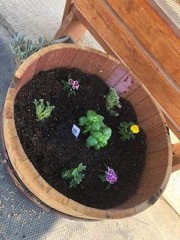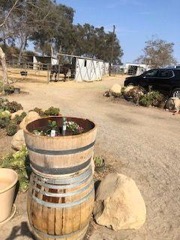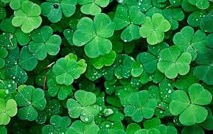The Sensory Garden

The Sensory Garden
Brought to you by: Madison Martinich’s Girl Scout Gold Award Project
The overall goal of this project was to create an informational, horse-friendly sensory garden at Hearts Therapeutic Equestrian Center. Studies show that the plants in this garden have medicinal uses for the horses, and many of the plants have scents that will help to stimulate the rider’s senses. The garden will also improve the appearance of Hearts and make the areas along which the garden is planted more appealing. The wine barrels were donated by local wineries and I built them into planter boxes and purchased the plants and soil from local stores.
This document informs visitors about the properties of each of the plants in relation to the horses and how the plants help to stimulate the riders and the benefits of the stimulation.

Below is information about each of the plants you can find in the garden, as well as their benefits to the horses or riders.

Clover - Trifolium pretense
Both red and white clover are medicinal; however, red clover is more readily available and improves soil quality by fixing nitrogen in the soil. A mixture of varieties of clover, will help show a calmer, gentler side of a horse. Red clover is an antioxidant, and helps a horse assimilate iron while supplying vitamin C, protein and calcium. It is also a mild phytoestrogen, can be used to treat hormonal imbalances, and the National Cancer Institute has confirmed red clover’s efficacy as an anti-cancer treatment.

Sage - Salvia officinalis
Sage is anti-bacterial, anti-microbial, and encourages healthy coats for horses. Additionally, sage is known to help reduce insomnia and ease anxiety in humans. Sage will help to calm the riders, and also stimulate their senses through both its scent and texture.

Thyme - Thymus vulgaris
Thyme is a strong anti-inflammatory that can clear out head colds and stop aches and pains. Thyme can be used to keep fungal and parasitic infections at bay.

Peppermint - Mentha piperita
Peppermint is both calming and invigorating. It rejuvenates the system while taking the edge off stress and nervousness. Peppermint helps to normalize digestion, which can be helpful to the wellbeing of any colic-prone horses, especially in the wintertime.

Mint - Mentha
Mint is known to increase alertness and cognitive performance. It also helps with bad breath and removes germs that cause bad breath. Mint has soothing properties and a rich, inviting smell, which is why it is often used to support digestion and eating in horses.

Basil - Ocimum basilicum
Basil can help with controlling emotions. The scent of basil accesses the limbic system, which controls emotions and also the nervous system, helping to relax both. For horses, basil can be used to treat muscle spasms.

Dandelions - Taraxacum officinale
Dandelion is a powerful detoxifier, primarily used to treat digestive system problems. Dandelion, being a powerful tonic, will detoxify the blood and liver as well as cleanse the entire digestive tract. Since arthritis and rheumatism in horses often stems from improper digestion, dandelion is a natural remedy for all such ailments. (Not planted in the garden)

Chamomile - Matricaria chamomilla
Chamomile is a perennial flower that grows happily in all climates, especially those with warm, dry soils. Many of us are familiar with chamomile as a calming night-time tea; in addition to its calming properties, it is a general anti-inflammatory and soothes the digestive tract. The flowers are a horse's favorite snack. (Not planted in the garden)
Sources: https://equinewellnessmagazine.com/herbal-pasture/

